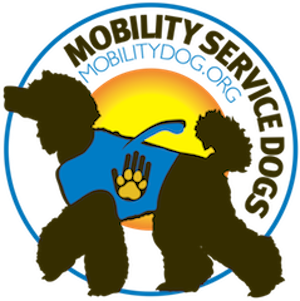How Many Words does Your Dog Know?
Beckett the Mobility Service Dog (Courtesy: MobilityDog.org)
You know Princess is smart – you trained her, after all – but just how big is her vocabulary? After all, her legacy is one of sophisticated communication skills. From the dawn of dog domestication, communication between humans and canines has been the cornerstone of our cooperation. Dogs’ success at becoming our partners has depended on their ability to discern and respond to the cues we provide: words, gestures, sounds (like whistles) and facial expressions. We succeed together because we have many ways of conveying to our dogs what we want from them.
How Big is a Dog’s Vocabulary?
For at least 100 years, scientists have tried to determine how well dogs comprehend human speech. One study from 1928 found that a young male German Shepherd could recognize 68 words and phrases. In 2004, observers studied Rico, a Border Collie, who wowed the scientists with his ability to identify and retrieve more than 200 items, including different balls and stuffed toys.
A Woman Next to a Service Dog (Courtesy: MobilityDog.org)
Across an array of studies of dogs’ comprehension of language, researchers have determined that, on average, dog owners estimate that their pets can differentiate across 80 to 90 terms, half of which would be classified as commands. The range goes from more than 200 words for the most encyclopedic dogs to as few as 15 for the least “wordy” canines. The average dog knows 89 words and phrases, but some are super smart! (Source: ZMEScience.com) This doesn’t mean that dogs on the lower end of the scale are necessarily intellectually limited – they may just be playing it cool, not letting on that they understand some commands they’d rather not follow.
One study confirmed that dogs do understand the nuances among human-uttered terms – it’s not just our imagination or lucky guesses on the part of our pets. The scientists put electrodes on the heads of 18 pet dogs to judge their reactions to different words. The dog’s owner would then speak a phrase, such as, “Princess, here’s the ball.” After a short pause, the owner then appeared behind a window with an object in hand. Sometimes it was the object mentioned in the sentence, sometimes not. The electrodes recorded the animals’ reactions when they saw the correct object (the one mentioned by their owner) or an incorrect one (a stuffed toy when a ball had been referred to, for example). The researchers observed that the wave signals dipped when the spoken word and the object matched, but not when there was a mismatch. The scientists concluded that the animal recognized the correspondence between the word and the object.
Learned Vs. Genetically Influenced Behaviors
A Pack of Four Poodles Sitting on a Deck Outside (Courtesy: MobilityDog.org)
Our pooches can identify many objects and follow what are sometimes complex commands. They have these skills because they pay close attention to their human companions. But, as is so often the case, scientists want to know whether a demonstrated behavior was learned or genetically determined – nurture vs. nature.
A study published in Current Biology provided some strong clues about the answer to this question. The study team tested 375 8-week-old retriever puppies on social-cognition indicators. Using measures of relatedness among the pups, the researchers calculated how such behaviors as sensitivity to pointing gestures and attention to human faces seemed to vary across the study population. They determined these two behaviors had high heritability (that is, the sharing of genes across the studied population explained a significant proportion of the variation in dog performance). In the point-following task, for example, genetic factors accounted for 43 percent of the variation in behavior. The researchers concluded, “Collectively, our results demonstrate that dog social skills emerge robustly in early development and that variation in these traits is strongly influenced by genetic factors.”
Evolution Has Helped Build Dogs Build Their Vocabulary
Through the process of domestication, evolution has endowed dogs with a biological preparedness for human social interaction, including speech. Of all the species on earth, dogs are unique in living in a world rich with human words and gestures. Indeed, canines became our life partners precisely because they demonstrated the ability to receive and respond to sometimes complex human communication.
Still, as amazing as a 200-word vocabulary is, think how impressed we’ll be when our dogs can respond to this command: “Do my taxes.” Now that’s a useful canine!



